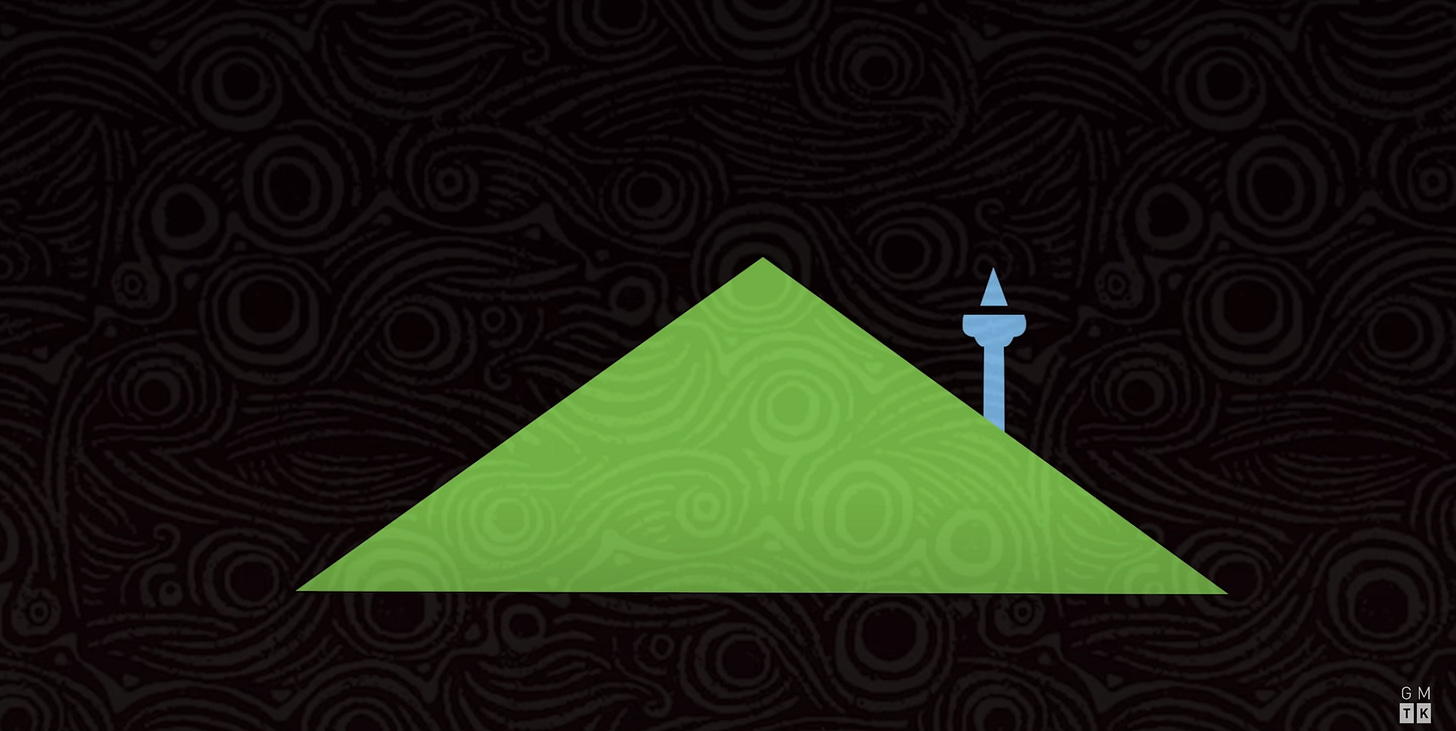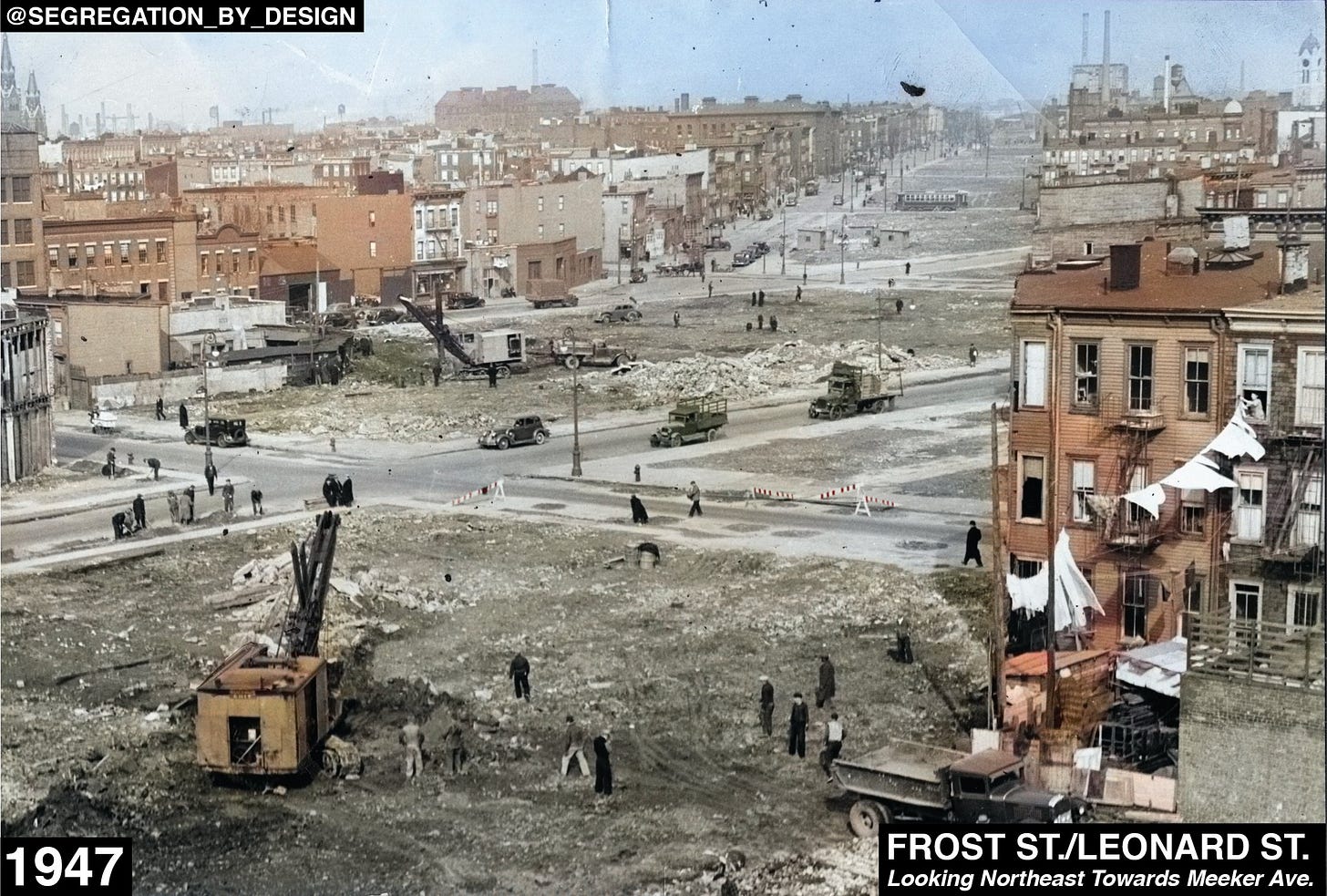The Storytelling Trick Hidden Inside Zelda
Also: Sudowrite's Story Engine & Generative Onchain Choreography
I love Zelda games. I loved Breath of The Wild (BoTW), and I’m now playing Tears of the Kingdom (ToTK). World and level design is a huge part of the success of any game, and there’s a lot of work that was done with both BoTW and ToTK to pull players through an open world such that incentivises exploration and eventually gets players where they need to go.
In an open world game, you want to strike a balance between:
ensuring players don’t get too lost and subsequently lose interest AND
not having it feel like a glorified linear theme park ride where the open world is actually just dressing.
To do that, BoTW came up with a trick they call “The Triangle Rule”. And, I find that’s a brilliant way to think about storytelling in general.
In short, the world design focuses on littering it with perspectives that tend to do two things:
show some interesting on the horizon
that is hidden BEHIND an obstacle.
By getting closer to the obstacle, more of the world reveals itself, sometimes taking the player off-course to other interesting things along the way.
I’ve always thought this is a brilliant encapsulation of structuring scenes. One of my favourite books about storytelling is Jack Bickham’s “Scene & Structure”.
A scene, according to Bickham boils down to three parts:
A goal.
The conflict.
The “disaster” (the result of the conflict).
…that then through some resolution leads to the next goal. Bickham is more explicit that the ‘disaster’ part of a scene needs to up the stakes and raise the tension, but I interpret it as the inevitable resolution of the conflict that leads it into the next scene.
It’s reminiscent of the South Park creator’s story rule: use BUT and THEREFORE, never AND THEN.
In other words, each scene CAUSES the next scene.
Why Zelda’s open world design works so well is that it feels the actual physical world is set up like great scene structure in a story. Playing Zelda feels like your journey is cobbled together by BUT’s and THEREFORE’s. A goal is always visible beyond the interstitial conflict and obstacle. When you write a scene, making sure that the reader knows what the goal and conflict is as soon as possible keeps them moving.
In Zelda: “I was on my way to the Sky Tower in the distance, BUT, now there’s a chasm in my way. After crossing it, I discover it’s really cold, and THEREFORE, after spotting the SPICY PEPPERS, I grab them and make a quick cold resistance stew from it.”
…and so on.
When an open world takes you to an “AND THEN”, it’s then when players can risk losing interest. The same for stories. A great story unfolds from each scene: a long cascade of actions and reactions.
It’s so fun playing Zelda. Time to get back to it! Have you been playing the new Zelda?
PS. I turned on paid subscriptions for the newsletter. I don’t intend on doing paywalled posts any time soon. It’s merely a tier for patronage. If you enjoy this newsletter every week, please consider subscribing and supporting it!
Sudowrite’s Story Engine
Sudowrite released it’s long-form “Story Engine” this week and people are MAD. It creates long-form novels by essentially granularising the writing process (from synopsis to the chapters). Through each more granular generation step, a writer can edit/change the details.
The pushback ranges from:
There’s a massive writer’s strike atm. Are you tone deaf?!
Why would you suck the soul out of the creative process?
You’re not a good writer if you use tools like this (or you are not a writer at all).
This is plagiarism.
Actual death threats (and unalive requests).
The entire thing just produces a huge groan in truth, because there’s a lot of complicated emotions around it. Navigating a conversation like this, especially on social media is a huge pain.
I am a writer, so I understand it. A large part of the negative response is born from a fear, especially during a crucial time like the writer’s strike. Livelihoods feels at risk and what it means to be a writer is going to chang. Thus predictably, one of the response is: “You are not a writer.” This kinda of response isn’t new. Digital art is not. DJs don’t play music. Sampling is stealing. Photography is not art. Dadaist Readymades is not art. etc, etc.
Part of that response comes from fear of not just losing one’s livelihood (which is REAL), but it’s also about relationships, networks, and meaning being lost.
Molly’s take IS true, but there’s also an inverse to this. It can feel like unjust encroachment if someone also classes themselves as a writer if they did not use the common accepted process to do so. I am, I tell myself, a writer, because I took years to write a sci-fi novel. It has my soul in it. It feels like cheating and in a sense, then, a fear that one’s own sunk cost struggle will be worth nothing. If a person can concoct a good AI book in way less time and blood, sweat, and tears and it gets sales on Amazon (which hasn’t really happened to an extent that it represents a threat), then who am I? What is then, the story I tell myself, perhaps, the most important story of them all?
I understand that, but, I also want to see more stories in the world: even if it’s just an AI written book that will be read by 10 people. I think particularly of people who can get to feel what it’s like to get to something that feels like a novel, but struggles to do so: either because they are not native English speakers or not having time for it (for whatever reason).
Legally, with most of current data-ming and copyright regimes, it’s all legal (afaik) when sufficient creative energy has been put into it, but I would still prefer if we can reward data input (and provide sufficient opt-outs). The worst case is that we end up creating a stricter copyright regime as a result of this technology that really just ends up working for people who already has money. The recent Warhol case, points to that. Fair Use? Better lawyer up.
Here’s another great summary of the Warhol case, outlining fair use rights vs right to derivatives.
So yes. It’s complicated, messy, but maybe, just maybe, we shouldn’t do death threats. I know James Yu. I’ve read his stories. It’s great. This stuff will happen in some form. Our conversation is best channelled towards figuring out: how do we have more stories for more people to enjoy? How do we pay more of these people so that they can ALL can have a livelihood? I don’t know the answer, and thus, I understand that it’s complicated.
But, pushing back with ego around the identity of the creator, and gatekeeping what it means to be a writer, isn’t one of those things. Let people call themselves an artist/musician/writer no matter how they choose to extrude their ideas into the world. A world with more stories is better for it. Rising to that challenge is the more interesting struggle compared to closing the gates. There’s a world of stories coming and we need to find them the right readers, and ensure that more writers can make a living than there is today.
What do you think? I’d be curious to hear both takes from writer and non-writers.
Construction of the Brooklyn Queens Express
It’s wild what Robert Moses (and a certain era of urbanism), could get away with.
Cool Portal Illusion
This one broke my brain a bit. A really fun illusion.
ht Gio
Technological Change Since the 90s
Noah Smith has a great article on some of the big changes in life/society since the 90s.
He says that we have more screen time, we never get lost, uncertainty/mystery has evaporated, and there’s more memory to many things.
Reading this makes me think of another tweet I saw this week.
All this technological change brought about the collapse of many local status games. And, I don’t always think that’s a good thing. If there’s one policy, I believe that would remedy some of our current western ailments is the mass investment in local culture, community, and sports. Give more people a reason to do things that matter to people nearby. Tangentially, I think this collapse of local competition, folded into global competition is also one of the answer as to why mass media has grown increasingly consolidated.
What’s the biggest technological change for you in your lifetime thus far?
A Black Market for an Iris?
The future is already here, it’s not just evenly distributed, right? Playing Cyberpunk bingo, we have a cryptocurrency called Worldcoin, being distributed by an iri-scanning orb. And people have been paying others for use of their iris’, creating a black market to buy it.
😅
Onchain
I love Jacob Horne’s crypto essays. Here he is making the simple case of the value of putting more works onchain. Very much in the direction it needs to go. I’ve been hoping that we move away from market-first nomenclature to provenance-first. This is one such step.
Generative Choreography and NFTs
Operator is a wonderful combination of artistic ideas. I love dancing, generative art, and NFTs, so this is right up my alley.
Plini - Pan
This week, I got to see Plini, live (and got to meet in person!). I love me some progressive instrumental metal! That’s the song for the week.
Bumper newsletter this week. As a reminder, if you made it this far: I turned on paid subscriptions this week. There’s no paywalling (for now), so it’s merely a patronage tier. If you enjoy this newsletter, please subscribe!
Take care, enjoy a sunset, and see you next week!
Simon









